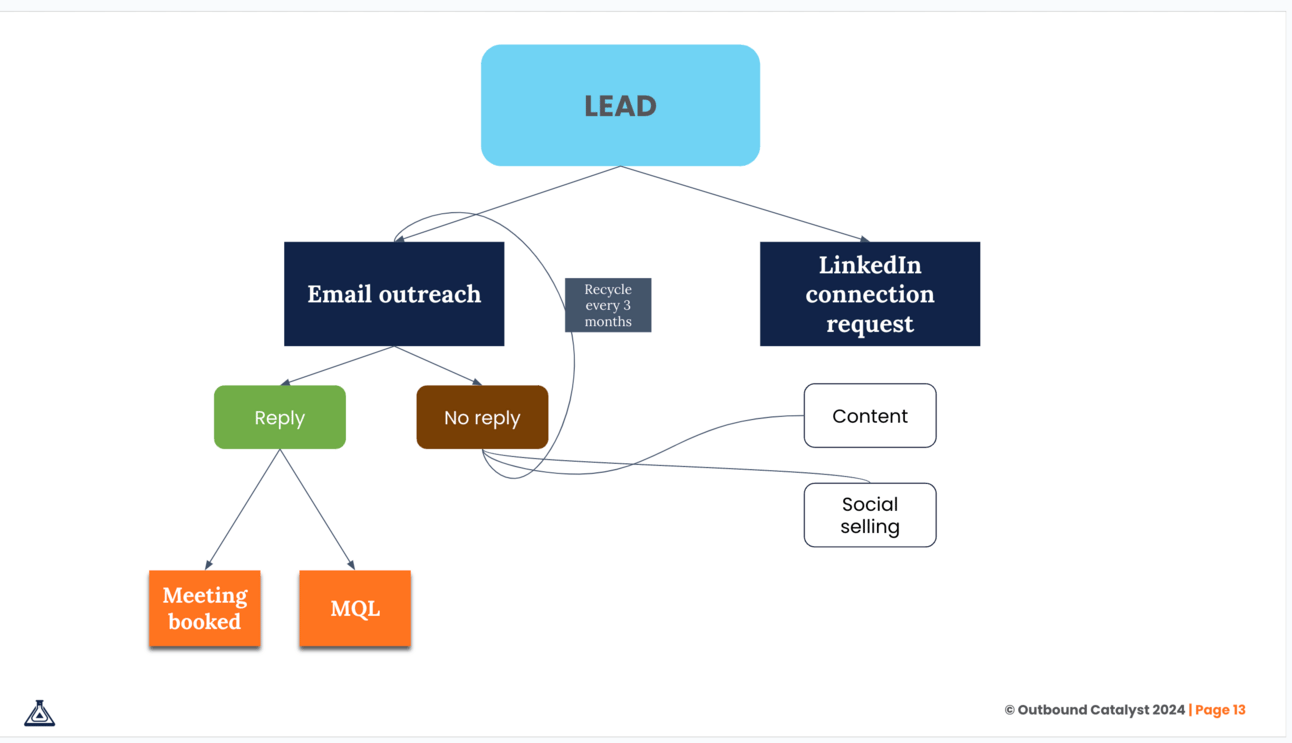- Outbound Catalyst
- Posts
- How to Not SPAM your small TAM
How to Not SPAM your small TAM
The Smart Approach to Small TAM Outreach: Quality Over Quantity
Why Spray-and-Pray Doesn't Work for Small TAMs
When your total addressable market is limited, every contact becomes precious. Unlike companies with massive potential customer bases, those targeting niche industries or specific enterprise accounts can't afford to burn through leads with generic, high-volume outreach tactics.
We recently discussed this topic with Frank from The Forge in our LinkedIn event "What To Do When Your TAM Is Not Big Enough" (link to full conversation below), and want to share a strategic framework for maximizing results from your finite contact list.
The Intelligent Targeting Flowchart
Our approach starts with a simple premise: treat each lead as a valuable asset that should be engaged thoughtfully over time, not exhausted in a single campaign.

The flowchart above illustrates our recommended approach: Starting with a lead, you have two primary outreach paths - LinkedIn connection requests and email outreach. Email responses can lead to meetings booked or MQLs, while non-responses should be recycled quarterly. Note the emphasis on content and social selling to support your LinkedIn connections.
Starting Point: Your Lead List
Begin with your curated list of leads within target accounts. For most B2B scenarios, you'll have two primary channels:
Two-Pronged Approach
1. LinkedIn Connection Requests
Send connection requests without pitching
Don't include sales messages in your initial connection
Allow them to accept and engage naturally
Support this with consistent, valuable content in your feed
Be patient and build relationship equity
2. Email Outreach (for 80-85% of leads with valid emails)
Send relevant, personalized messages
Ensure your outreach is:
Timely for their business situation
Relevant to their specific role
Tailored to their company context
Clear about why you're reaching out to them specifically
Response Management
If They Reply:
Schedule a meeting if they're interested
Note timing preferences for future follow-up
Identify the correct decision-maker if you've reached the wrong person
Document any insights for future conversations
If No Reply:
Don't bombard them with immediate follow-ups
Add them to your quarterly re-engagement cycle
The Quarterly Recycling Strategy
Instead of pestering non-responsive leads, implement a strategic recycling program:
Q1: Initial outreach to your target list
Q2: Focus on completely new contacts
Q3: Re-engage Q1 non-responders with fresh messaging
Q4: Focus on new contacts again
This approach ensures you're always balancing between mining existing leads and developing new opportunities, without burning through your limited TAM.
Benefits of This Approach
Relationship Preservation: You avoid becoming "that spammy company" that bombards inboxes weekly
Extended Reach: By spacing out contact attempts, you increase the chances of reaching people at the right time
Fresh Messaging: Quarterly updates allow you to refine your value proposition based on market changes
Resource Optimization: Your sales team can focus on engaging with new prospects while maintaining a structured re-engagement strategy
Want to Learn More?
Check out our full discussion with Frank from The Forge on LinkedIn, where we dive deeper into strategies for maintaining relationship quality while maximizing outreach effectiveness in specialized markets.
What adjustments are you making to your outreach strategy for 2025? We'd love to hear your thoughts!